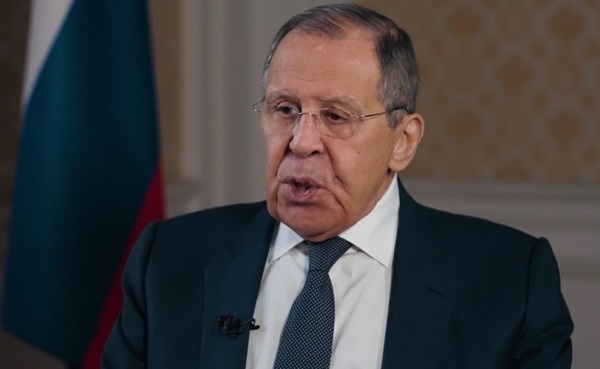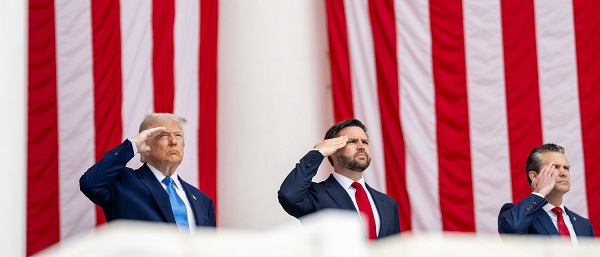conflict
Russia’s foreign minister tells Tucker the West must avoid making this ‘serious mistake’

From LifeSiteNews
By Frank Wright
Tucker Carlson’s interview with Russian Foreign Minister Sergei Lavrov, published Thursday night, was an 80-minute conversation that provides remarkable insights on war and politics beyond the narratives we are told by the news.
Tucker Carlson’s interview with Russian Foreign Minister Sergei Lavrov was posted Thursday night.
If you are interested in whether there will be a world war, why, and indeed whether it has already started, the 80-minute conversation will provide remarkable insights beyond the narratives we are told by the news.
Carlson begins with the question of the moment: Is the U.S. at war with Russia?
Lavrov says no, but that the danger is obvious. NATO and the West, he says, “don’t believe that Russia has red lines, they announce the red lines, these red lines are being moved again and again and again. This is a very serious mistake.”
Statements such as this can be dismissed as “Russian propaganda.” Yet Lavrov is simply stating the case. The Carnegie Russia Eurasia Center – the home of “world-leading” U.S./NATO strategic thinking – has admitted that “nudging Russian red lines” has been the gambit of the West for many years.
Lavrov explains the situation conversationally, but with a frankness uncommon from Western diplomats.
He explains that Russia seeks to avoid war, though it remains prepared to fight one.
READ: Putin calls out Biden for ‘escalating’ war in Ukraine right before Trump takes office
“We are ready for any eventuality, but we strongly prefer a peaceful solution through negotiations” – to the Ukraine conflict.
It was “Russian propaganda” until recently to speak of this as a U.S./NATO “proxy war” waged by the West against Russia, until Boris Johnson admitted it was a proxy war in an interview last week.
With so many former “conspiracy theories” having come true in the West, such as the Hunter Biden laptop, the tainted and dangerous COVID mRNA injections, and the narrative of the Ukraine war itself, Lavrov’s genial and revealing chat with Carlson reveals a rich seam of information.
He covers the death of Alexei Navalny, the effective suspension of U.S. diplomacy with Russia, the now obvious role of Boris Johnson in destroying peace and prolonging war in Ukraine, along with Russian relations with China and its role in the current Syrian war.
His remarks provide food for thought for an audience ravenous for information. It is understandable that Lavrov’s view of these events would prove controversial, as the denial of the obvious is a basic principle of the liberal-global system which is currently fighting Russia in two theaters of war.
It is a credit to Carlson that he asks Lavrov, at around the one-hour mark, what his opinion is on the question of who is in charge in the United States.
“Who do you think has been making foreign policy decisions in the U.S.?” Carlson asks.
“I wouldn’t guess,” says Lavrov. “I haven’t seen Tony Blinken in four years”.
Secretary of State Antony Blinken is the chief diplomat of the United States and is effectively Lavrov’s counterpart. That he has not spoken to Lavrov since 2020 is an extraordinary fact in itself, given the nuclear brinkmanship his administration has lately pursued, following a long campaign towards a failed proxy war against Russia.
Lavrov says in these four years all he has had from Blinken is a “few words” outside a G20 meeting, where Blinken astonishingly told the Russians, “Don’t escalate.”
Lavrov described the brief exchange: “I said, we don’t want to escalate. You want to inflict strategic defeat upon Russia?”
Apparently, Blinken rejoined, “No, no, no, no, it is not, it is not strategic defeat globally. It is only in Ukraine.”
Yet it is not only Blinken playing peek-a-boo. Lavrov’s description of the last meeting of the 20 most powerful nations is startling.
“Europeans are running away when they see me. During the last G20 meeting, it was ridiculous. Grown up people, mature people. They behave like kids. So childish and unbelievable,” he said.
Following this shocking depiction of the state of Western diplomacy, Lavrov moves to the serious business of regime change, saying it has long been U.S. strategy to “make trouble and see if they can fish in the muddy water” afterwards – in Iraq, for example. As for “the adventure in Libya,” he says, “after ruining the state [there] … they went on to leave Afghanistan in very bad shape.”
His summary recalls that of JD Vance, who denounced the last four decades of forever war as “a disaster” in his speech in May, when he asked, “What are the fruits of the last 40 years of American foreign policy? Of course, it’s the disaster in Iraq, it’s the disaster in Afghanistan, it’s Syria, it’s Lebanon, it’s on issue after issue after issue.”
Lavrov was far more polite about the matter, and said simply, “If you analyze the American foreign policy steps – ‘adventures’ … is the right word.”
There is simply no way to do justice to the example set by Russia’s leading diplomat. Of course, he skillfully represents Russian interests, but it is not to collude with him or his nation to note a master at work.
His extraordinary composure and command of the situation contrasts starkly with the near total absence of any diplomacy at all by the U.S. with this most significant strategic rival – or future partner. It is a credit to Carlson that he brings this view to the West, which explains so much of the crises in Ukraine and Syria from a viewpoint that has been canceled in the formerly free world.
If you have 80 minutes to spare you will learn more about the state of the world watching Lavrov than in a year’s consumption of mainstream media. One obvious shock is how impoverished our political system is, that it produces no one of the caliber of our supposed enemies, no one who discusses with cordial directness the naked truth of a near-nuclear crisis.
His sobering analysis can be condensed into one statement, from which it is hoped the red line nudgers will not seek to test. Lavrov warns the game players of the U.S. and NATO:
“They must understand that we are ready to use any means not to allow them to succeed in what they call a strategic defeat of Russia.”
This strategic defeat, now impossible in Ukraine, is being pursued right now by Western proxies in Syria. With one war about to end, another has been started. Russian patience is exhausted, and they have committed fully to preventing the takeover of Syria by U.S. and Ukrainian backed “foreign terrorists.”
It is to be hoped that someone will be in charge in a few weeks’ time who will listen, rather than hiding and seeking escalation.
Artificial Intelligence
AI Drone ‘Swarms’ Unleashed On Ukraine Battlefields, Marking New Era Of Warfare


From the Daily Caller News Foundation
Artificial intelligence-powered drones are making their first appearances on the battlefield in the Russia-Ukraine war as warfare creeps closer to full automation.
In bombardments on Russian targets in the past year, Ukrainian drones acting in concert were able to independently determine where to strike without human input.
It’s the first battlefield use of AI “swarm” technology in a real-world environment, a senior Ukrainian official and Swarmer, the company who makes the software, told the Wall Street Journal in a Tuesday report. While drones have increasingly defined modern battlefields, swarms until now had been confined to testing rather than combat.
“You set the target and the drones do the rest,” Swarmer Chief Executive Serhii Kupriienko told the WSJ. “They work together, they adapt.”
So far, the Swarmer technology has been used hundreds of times to target Russia assets, but was first used a year ago to lay mines on the front, the Ukrainian official told the WSJ. The software has been tested with up to 25 drones at once, but is usually utilized with only three.
Kupriienko told the WSJ that he was preparing to test up to 100 drones at once with the linking software.
A common arrangement used on the battlefield includes one reconnaissance drone to scout out the target and two explosive drones delivering the payload on target, the official told the WSJ.
While Western nations such as the U.S., France and the United Kingdom are also pursuing drone swarm technology, they have not deployed swarm technology on the battlefield the way Ukraine has, according to the WSJ. Currently, autonomous weapons are not regulated by any international authority or binding agreement, but ethical concerns around the technology has led many to call for increased regulation of weapons like the Swarmer system.
The Ukrainian Ministry of Foreign Affairs did not immediately respond to the Daily Caller News Foundation’s request for comment.
conflict
Trump Pentagon Reportedly Blocking Ukraine From Firing Western Missiles Deep Into Russia


From the Daily Caller News Foundation
The Department of Defense has spent months blocking the Ukrainian military from using American and British-made missiles to hit targets deep inside Russia, The Wall Street Journal reported Sunday, citing unnamed U.S. officials.
Undersecretary of Defense for Policy Eldridge Colby reportedly designed the procedure to review requests to carry out the long-range strikes with weapons that are either of U.S. origin or that require American intelligence or use components provided by the U.S., according to the WSJ. Secretary of Defense Pete Hegseth reportedly has the final say on whether Ukrainian forces can use the MGM-140 ATACMS (Army Tactical Missile System) to hit targets in Russia.
The reported blocks on missile strikes coincides with a Trump administration effort to broker a peace deal between Russia and Ukraine. A Pentagon spokesperson declined to comment further on the matter.
BREAKING: President Vladimir Putin reacts to B-2 Flyover pic.twitter.com/1mzVn7DxlW
— Jack Poso 🇺🇸 (@JackPosobiec) August 15, 2025
The Biden administration allowed Ukraine to carry out strikes with ATACMS in November, weeks after President Donald Trump won the 2024 election, the New York Times reported. Trump criticized the move during a December interview with Time magazine.
“It’s crazy what’s taking place. It’s crazy,” Trump said. “I disagree very vehemently with sending missiles hundreds of miles into Russia. Why are we doing that? We’re just escalating this war and making it worse. That should not have been allowed to be done.”
Trump and Russian President Vladimir Putin met in Alaska on Aug. 15 for a summit meeting during which Trump sought to secure a cease-fire in Russia’s war with Ukraine. As Trump greeted Putin, a B-2A Spirit stealth bomber and several fighters carried out a flyover of Elmendorf Air Force Base.
Trump met with Ukrainian President Volodymyr Zelensky and major European leaders on Aug. 18 to update them on the summit.
In July, Trump reached an agreement with NATO where members of the alliance would purchase weapons, including MIM-104 Patriot surface-to-air missiles, and donate them to Ukraine.
-

 Alberta1 day ago
Alberta1 day agoNet Zero goal is a fundamental flaw in the Ottawa-Alberta MOU
-

 Food1 day ago
Food1 day agoCanada Still Serves Up Food Dyes The FDA Has Banned
-

 National2 days ago
National2 days agoEco-radical Canadian Cabinet minister resigns after oil deal approved
-

 Addictions1 day ago
Addictions1 day agoManitoba Is Doubling Down On A Failed Drug Policy
-

 COVID-191 day ago
COVID-191 day agoThe dangers of mRNA vaccines explained by Dr. John Campbell
-

 Alberta1 day ago
Alberta1 day agoKeynote address of Premier Danielle Smith at 2025 UCP AGM
-

 Artificial Intelligence21 hours ago
Artificial Intelligence21 hours ago‘Trouble in Toyland’ report sounds alarm on AI toys
-

 COVID-191 day ago
COVID-191 day agoFDA says COVID shots ‘killed’ at least 10 children, promises new vaccine safeguards









